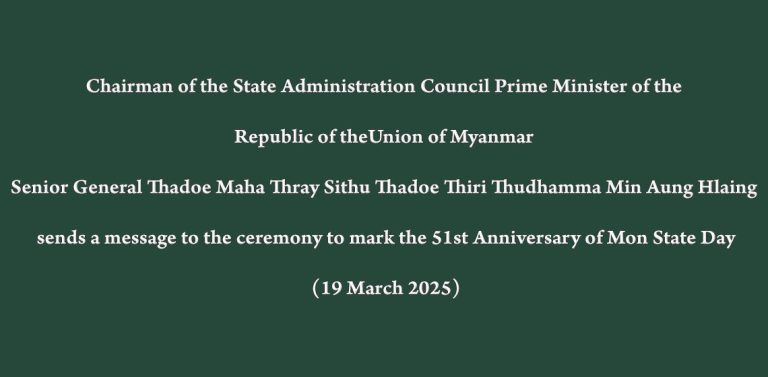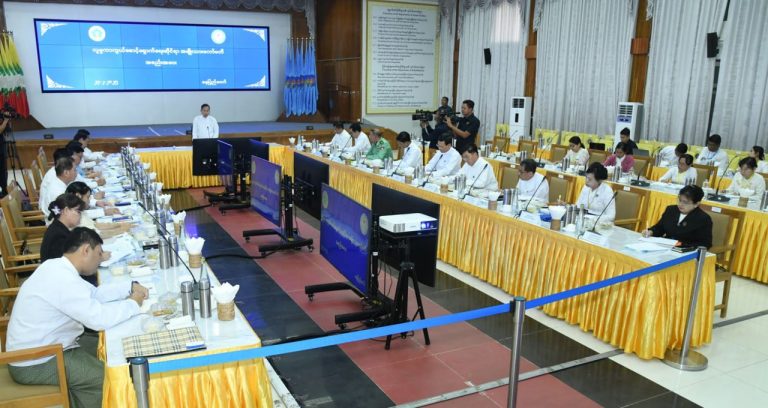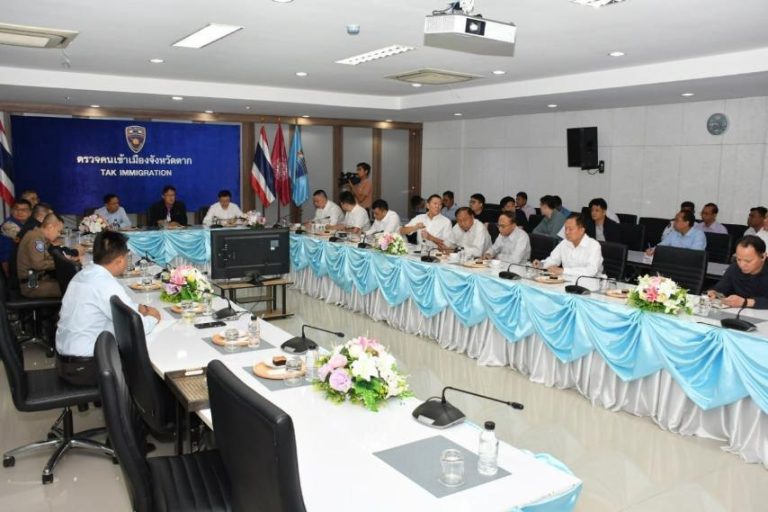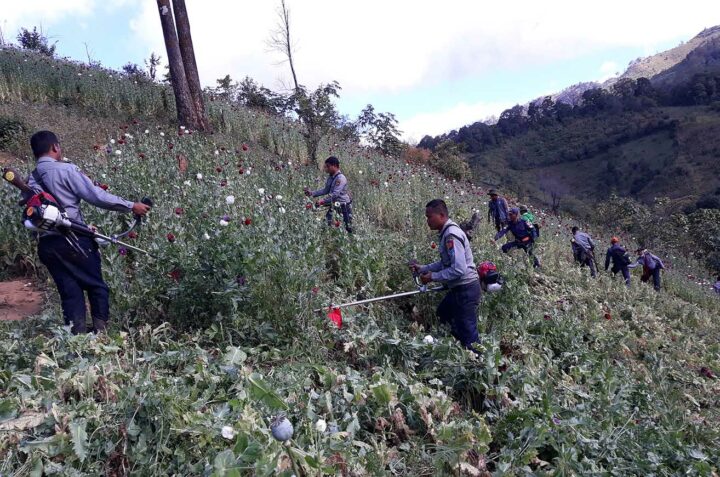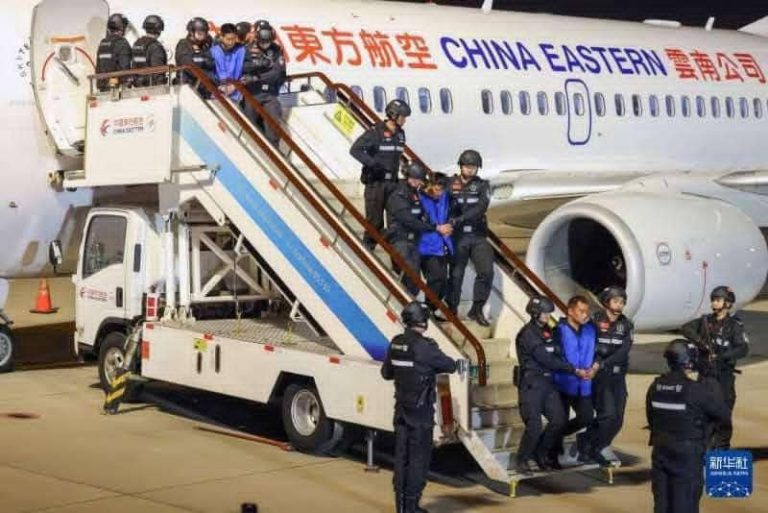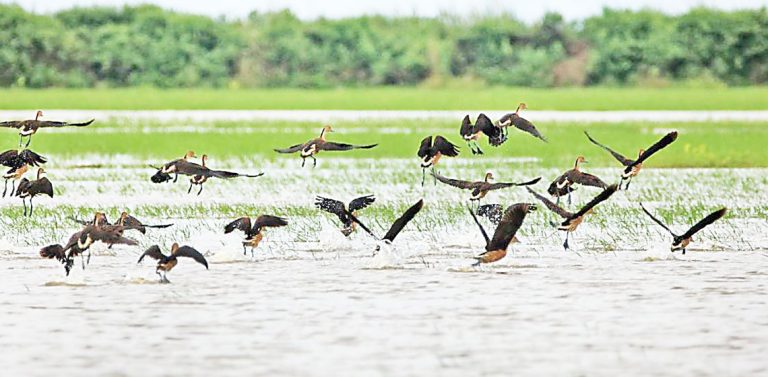28 August 2023
Written by Sai Thiha
In early August, an US online media, which likes to proclaim itself as “premier international current-affairs magazine for the Asia-Pacific region” and boast of its “quality analysis” with “open-mindedness”, published a photo report from the camp of one of the armed extremist groups in Myanmar. In numerous photographs, people in camouflage posed with automatic weapons in their hands. In the captions under the photographs, these militants were affectionately called “functionaries” of the armed group.
One could offer this “unbiased” US media to continue such a useful undertaking and prepare retrospective photo essays about how cute Al-Qaeda “functionaries” launch paper planes, trying to get into toy copies of the World Trade Center towers in New York. Or how kind ISIS “functionaries” go to buy a Christmas cake for US troops in Iraq. But it is unlikely that such a creative “quality analysis” will be appreciated by its readers.
In fact, all these “functionaries”, including their fellow extremists in Myanmar, have one thing in common: they arm themselves to kill people who just do not share their idea of what is good and what is bad. And it is easiest for them to massacre unarmed civilians, who are very convenient to be arbitrarily accused of collaborating with the enemy. In this sense, the “functionaries” of today’s extremist groups in Myanmar are no different from their counterparts from ISIS or Al-Qaeda. It’s just that they, according to the “unbiased” American publication, are “fighters for democracy”, which means they are “good” terrorists. And there are vile thugs who are fighting against the United States, and therefore they are militants with blood on their hands to the elbow.
Probably, if the Khmer Rouge in Cambodia almost half a century ago would have declared themselves not communists, but “fighters for democracy”, they would still be enthusiastically written about in the West today. Just think what nonsense – they killed a couple of million people. They did it in the name of a great goal and noble ideals!
On the flip side
Anyone who considers the publication in that US media to be just an unfortunate slip of the tongue is mistaken. Such euphemisms, designed to cover up the massive and brutal crimes of “armed resistance” in Myanmar, today fill the news feeds of Western agencies and the pages of outwardly respectable liberal newspapers.
For example, the well-established verbal stamp of an alternative Myanmar reality, widely wandering through the Western media is “tax collection by a parallel administration”. The imagination paints a lovesome picture of businessmen with joyful faces coming to the office to pay taxes – so that teachers can teach children and doctors can work in hospitals. In fact, the real picture is far from such beautiful-hearted fantasies. And in order to understand this, no need to invent various “local residents whose real name is not disclosed for fear of reprisals by the junta.” These mythical “locals” roam from article to article of Western authors, because they were taught so in Western journalism lessons: if you are not on the scene, then your words are less trustworthy than the opinion of a native you invented.
Therefore, as European philosophers say, it is not necessary to “multiply entities” and poke fingers at the generator of Burmese names in order to create another “local of the Sagaing region”, who, in the right place for the author, would say the words, confirming the conclusion to which he stubbornly pushes the reader. It is enough just to drive through the land of this region and see the reality with your own eyes.
The “parallel administration” most often appears in Myanmar villages after the militants kill the official administrator – and, as a rule, they massacre entire families, not sparing small children. As an option, they will intimidate the official administrator half to death and set fire to his house, forcing him and his family to flee their native village in a panic. After that, they declare some person of their own as an administrator – for example, a relative of one of the militants – and then the very “tax collection” begins. Or, to put it more simply, a racket accompanied by threats, arson, and sometimes murder.
In itself, such a “tax collection” is an indicator that the support of the militants by the local population is already so low that they have to engage in banal highway robbery. But the main thing is that this tax does not go to any “schools and hospitals”. The militants make no secret of the fact that they will buy weapons in order to kill even more unarmed people, whom they will arbitrarily consider to be “dalans” (informants of the official authorities) or accuse of “collaborating with the regime” – such as teachers or doctors who simply continue to work, and refuse to join the so-called “civil disobedience movement” (CDM) as they were ordered by the armed opposition.
Myanmar people have long understood that for any armed group the main issue is not “democracy” or “federalism”, which couldn’t feed the militants, but a foraging area. Now PDF groups in the peripheral territories of Myanmar divide spheres of influence by armed means, trying to recapture more wealthy villages from their rivals. And then they put there a “parallel administrator”, and enthusiastically, with guns in their hands, start collecting taxes. As the famous American gangster Al Capone used to say, “You can achieve much more with a kind word and a revolver than with a kind word alone.”
Therefore, journalists sitting in their cozy offices in Europe and America and imposingly drinking coffee should understand very well that when they type rosy phrases on their computers, such as “tax collection by a parallel administration”, at that moment the blood of innocent Myanmar civilians brutally murdered by their adorable “democracy fighters” drips from their fingers.
“Myanmar is on some kind of black list”
However, there is no need to present Western journalists as naive simpletons who do not understand what they are writing about. There are a lot of smart and sensible people there. Some of them even come to Myanmar on tourist visas in order to understand the situation “on the ground” for themselves. What they see is usually so inconsistent with the stereotypes common in the West that at first it is overwhelming. They see that in the vast majority of areas of Myanmar, peaceful life has long been restored, and if not for Western sanctions, people would have long been richer and more prosperous.
Sometimes these journalists take the risk of sharing their opinions about what they have seen with their Myanmar colleagues. At the same time, they ask not to be named, because even their publicly spoken admission of the fact that the situation in Myanmar “not as simple as its drawn in the West” is already a heresy that can affect their career prospects and financial well-being. Such is the irony about people who are constantly forced to invent “locals whose names have been changed for security purposes.” However, in the case of Western journalists, their names are not needed – because such point of view is very widespread among the foreigners who are truly interested in Myanmar.
A journalist from a leading German news media outlet says: “I tried to send a link to the article in The Global New Light of Myanmar to my colleague via Facebook messenger. This English language government newspaper is not published by Tatmadaw, and I have never seen aggressive articles or calls to kill anyone there. Well, Facebook didn’t allow me send this link! And that’s in a private message, not in a public post! But at the same time, it is full of pages of armed groups boasting of their exploits.
“In our editorial office, it is something similar – the state media of Myanmar can only be quoted if this is followed by ridicule or withering criticism of their statements. At the same time, we uncritically reprint whole paragraphs of articles in the Myanmar media that support the armed opposition and promote their views in every possible way. And I drew a conclusion about the quality of their information from the latest ‘silent strike’, which the opposition called for: there were quite a lot of people on the streets of Yangon, despite the demands of the ‘revolutionaries’ to stay at home, but these media posted photos of empty roads. As a local journalist told me, these pictures were taken back in 2020, during the coronavirus lockdowns – even some opposition media acknowledged it. But in Europe they believed this, and photographs of empty streets went for a walk on the newswires of media outlets”.
A correspondent of a well-known European news agency explains the requirements existing in his editorial office for coverage of the Myanmar events: “There is a directive: everything related to the ‘struggle for democracy’ in Myanmar should be supported by the ‘opinions of grassroots’. And if we are talking about the position of the regime, then it is permissible to refer only to the statements of high-ranking officials, or to the words of some odious and marginal characters. As a result of such simple manipulation, it seems that the ‘junta is hanging in the air’ and does not enjoy any support from the people.”
And a freelance journalist, working for one of the leading US media outlets, tried to write an article about her compatriots, who, by the will of fate, are now living in Myanmar. The interlocutors told her a lot of interesting things that they witnessed – and, among others, about the killing of civilians by armed opposition groups, as well as the fact that ordinary people are suffering because of Western sanctions. All this was mercilessly crossed out by the editor and only criticism of the military was left. “I just wanted to show that the reality in Myanmar is much more complicated than it is pictured in the United States,” the journalist told. – I used to be able to convince the editor that it was worth writing about. But this time the refusal was very hard. It looks like Myanmar is on some kind of black list.”
The general conclusion drawn by Western journalists who agreed to communicate with their Myanmar colleagues without mentioning their names in the media is that high-quality analytic journalism in the West is dead, only rabid propaganda remains, and this applies not only to Myanmar. The excuses given to them by their superiors boil down to the fact that propaganda is needed because “there is a fierce struggle between democracy and authoritarianism in the world” and “we must contain the rising China with all our might.” And the answers to the question why they continue to participate in all this usually come down to phrases that “I’m only three years before retirement – I’ll finish it somehow”, or “I have small children, they need to be fed and paid for school”, or “today Europe is going through hard times, and I can hardly find another job”, or even “all the truth-tellers and idealists have already quit – only we are left”. It turns out that, regrettable, many Western journalists, in order to save their own financial well-being, are ready to put up with any abominations.
At the same time, they closely follow the agenda, capturing new trends in the liberal mainstream regarding how to write about Myanmar “correctly”. As soon as one of the Western authors supporting armed extremists in Myanmar launched into a rant on the topic: “the entire people of Myanmar believe that Tatmadaw is too honorary name for the current armed forces, therefore they should be called sit-tat, just ‘military’” – and right there dozens of journalists took this as an instruction to learn a new word and write strictly in this way, not otherwise. Truly striking is the liberal herd instinct of Western journalists, who are ready to mindlessly run with the whole flock after every self-proclaimed judas goat anywhere – even to the slaughter-house.
When in January 2015, ISIS “functionaries” broke into the office of the French magazine Charlie Hebdo and shot several people, Western journalists immediately disguised in T-shirts with the inscription: “Je suis Charlie”. And when approximately the same “functionaries” of extremist groups break into houses and kill civilians in Myanmar, these journalists write touchingly enthusiastic articles about them. It is clear that Myanmar is far away, and it is unlikely that the bloody lawlessness that “pro-democracy” militants are doing in their country would ever reach the streets of Paris, London and New York. And so you can fearlessly admire these murderers at a distance.
One of the leading European politicians of the 19th century, Otto von Bismarck, once said: “If you want to build socialism, choose a country that you don’t mind.” For the 21st century, this phrase has long sounded a bit different: “If you want to impose Western democracy with weapons in your hands, choose a country that you do not care about.”
It is sad that today’s Myanmar is one of the countries for which Western “democrats” have absolutely no compassion.
Happy New Year 1984!
Exactly one hundred years ago, a young Briton named Eric Arthur Blair served in the Burmese colonial police force. During his service, he witnessed many abominations that were done in that British colony by the great-grandfathers of the current Western “democrats”, who today brazenly interfere in the affairs of Myanmar and try to teach its people how they should live.
After everything he saw, Eric Arthur Blair became a harsh critic of colonial policy, and even once wrote: “I had already made up my mind that imperialism was an evil thing and the sooner I chucked up my job and got out of it the better. Theoretically – and secretly, of course – I was all for the Burmese and all against their oppressors, the British”. He also mentioned an intolerable sense of guilt that depressed him because he himself was forced to exist in this paradigm.
In the end, he left the colonial service and gained creative freedom, which was no longer restrained by any bosses. He gained worldwide fame under the pseudonym George Orwell, and perhaps his most famous novel is “Nineteen Eighty-Four”, which paints an eerie picture of a totalitarian society with mass surveillance and brainwashing. Orwell masterfully describes the phenomenon of doublethink, when a person simultaneously has two absolutely opposite points of view, both of which he considers correct, and which often contradict reality and his own life experience.
But the most impressive phenomenon of the totalitarian world described by Orwell is Newspeak, a propaganda language marred by ideology, in which words lose their original meaning and mean something opposite. On Newspeak, the slogans for 1984 sound like this: “War is Peace”, “Freedom is Slavery”, “Ignorance is Strength”.
If, following this logic, we begin to assert that “terrorists are functionaries” and “murders, atrocities and racketeering are tax collection by a parallel administration”, then we will get today’s Newspeak mainstream of Western agenda for Myanmar.
And obediently walking in orderly rows to this Newspeak melody, Western journalists do not even notice that today they have almost come in their countries to that eerie reality, far from democracy, which Orwell masterfully described in his book, and which previously used to horrify them.

